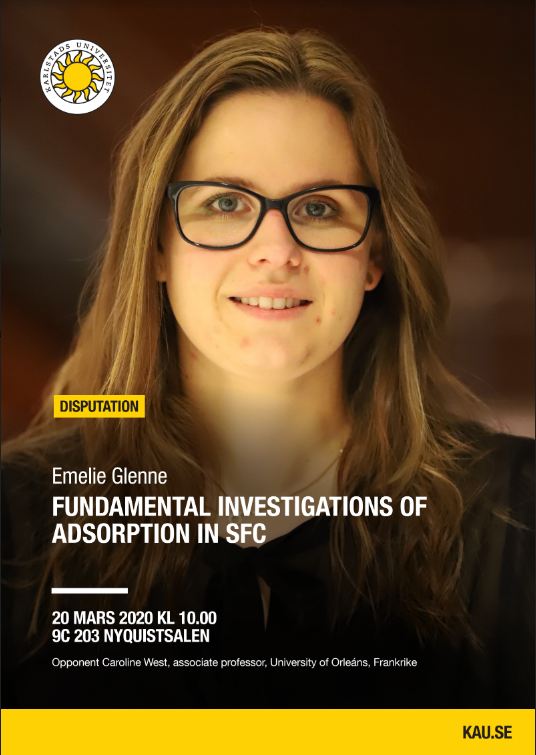On the 20th of March 2020 Emelie Glenne will defend her thesis on Supercritical Fluid Chromatography titled “Fundamental Investigations of Adsorption in SFC”
Where: Nyquistsalen, 9C 203, Karlstads universitet, Karlstad
When: 20/3 at 10:00

Download thesis here
Paper I : A closer study of methanol adsorption and its impact on solute retentions in supercritical fluid chromatography
Paper II:Peak deformations in preparative supercritical fluid chromatography due to co-solvent adsorption
Paper III: Systematic investigations of peak deformations due to co-solvent adsorption in preparative supercritical fluid chromatography
ABSTRACT
In supercritical fluid chromatography (SFC) the mobile phase is composed by carbon dioxide as the main weak solvent, in a condition between a gas and a liquid. The interest in SFC has recently increased due to several advantages compared to traditional liquid chromatography (LC) such as faster sample throughput and lower environmental impact. However, there is still a lack of fundamental knowledge about SFC, among others, due to the compressible mobile phase. This thesis work aims at a deeper understanding of the functions of the mobile phase components used in SFC through systematic adsorption studies.
In Paper I, surface excess adsorption isotherms of the co-solvent methanol on a diol silica adsorbent was investigated. It was revealed that a monolayer of methanol was formed. In Paper II, severe peak deformation effects due to this adsorption were revealed, and it was demonstrated under which conditions these deformations appear and how the co-solvent fraction can tune the shape of the eluted peak. The findings in these papers revealed that a competitive additive model best predicts the solute retention at low methanol fractions whereas at higher fractions, when a solvent layer has formed, methanol acts just as a modifier. In Paper III, the generality of the effects was proven by investigations of other co-solvent/stationary phase combinations. In Paper IV it was investigated how the robustness of SFC separations depend on the co-solvent adsorption, pressure, and temperature. In Paper V, the impact of the addition of amine additives on separation performance was investigated. Two different underlying mechanisms for solute peak distortions were revealed: (i) deformations generated by the perturbation peak and (ii) deformation due to multilayer formation promoted by the additive.
The deeper knowledge about SFC obtained in this thesis provides guidelines for development of more robust SFC methods for analysis and preparative separations where peak distortions can be avoided.
